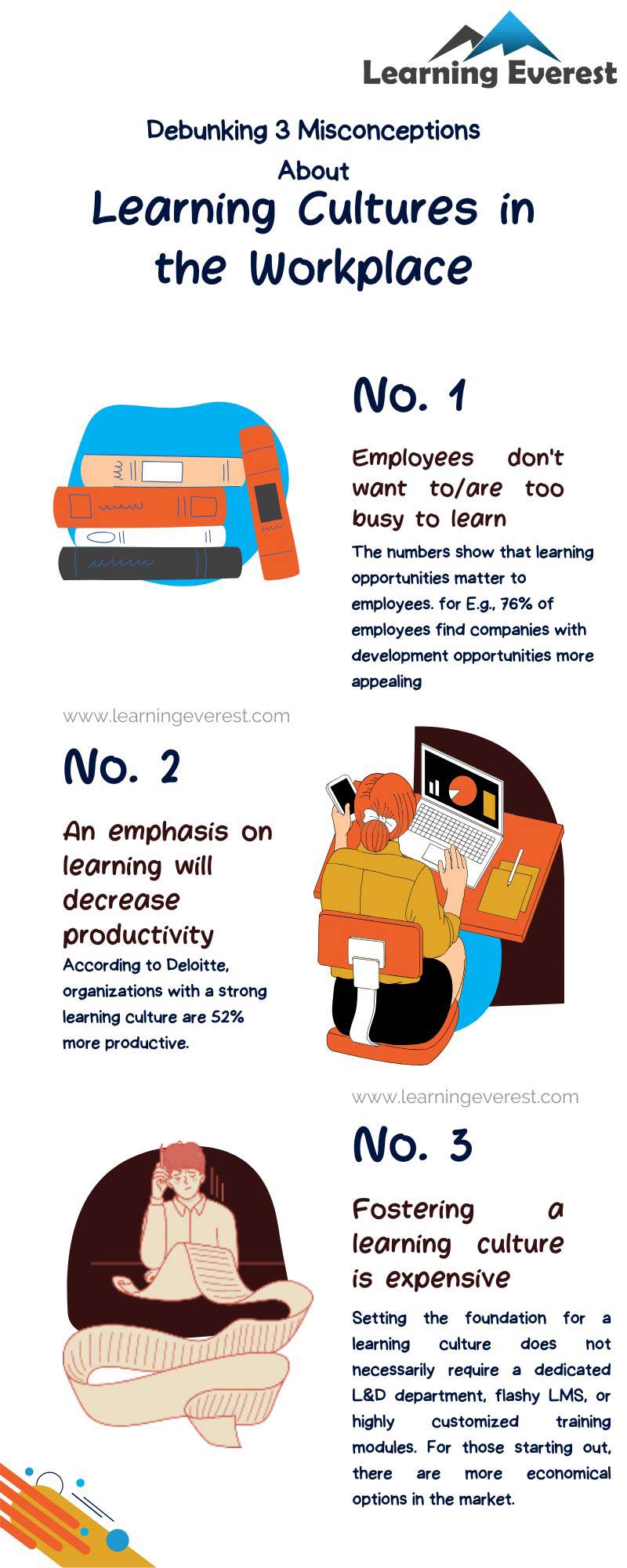In this post we will be debunking 3 misconceptions about learning cultures in the workplace. Today, the importance of a learning culture is a well-established fact in the corporate world. However, many leaders still harbor some resistance to the idea. A common sentiment observed among those who place lesser importance on continued learning is “we don’t need it”. This article will debunk some common misconceptions that can lead people to discount the value of a learning culture.
Table of Contents
Learning Culture: What Does it Mean?
Before diving in, let us briefly look at the meaning of a learning culture.
A learning culture is a company-wide emphasis on personal and professional development through continued learning activities that then lead to knowledge sharing for the collective growth of the organization.
The term learning culture is often used in tandem with Carol Dweck’s concept of growth mindsets, which is the belief that conscious effort and perseverance can develop your natural abilities even further.
When an organization has a learning culture, its employees have a growth mindset and are motivated to cultivate their talents, pay attention to feedback, and have a positive attitude toward obstacles and challenges.
These attitudes along with a constant flow of information and knowledge set organizations up for innovation, creativity, and productivity.
Why, then, do some organizations shy away from understanding the importance of learning culture at a workplace and how to promote a learning culture in an organisation?
Misconceptions About Learning Cultures
Misconception No. 1 – Employees Don’t Want to or Are too Busy to Learn
One of the reasons why leaders might not be on board with the idea of a learning culture is the belief that employees are not interested in learning, either due to a lack of will or a lack of time.
Such assumptions could stem due to several factors:
- A true disinterest among employees in the organization’s existing learning offerings
- Low ROI and completion rates
- A lack of meaningful change after training and development efforts
- A different set of priorities on the management side
The literature on learning cultures, however, refutes this misconception. The reality is that most employees want to learn and seek out opportunities for the same.
For instance, 9 out of 10 employees say that they would stay at an organization that allows for continued learning. 76% of employees find companies with development opportunities more appealing. To 87% of millennials, organizational learning and development are important.
On the flip side, if employees do seem disinterested or too busy, it is worth re-evaluating current organizational training efforts. Despite training efforts, employee dissatisfaction with development opportunities remains a rampant problem.
One way to ease into a learning culture is to leverage e-learning solutions that cater to your employees’ specific learning needs. Some examples are:
- Microlearning for quick, just-in-time learning
- Gamification for engagement
- The use of multimedia tools to make the content interesting
- Scenarios and simulations for developing concrete real-world skills and problem-solving abilities
Misconception No. 2 – An Emphasis on Learning Will Decrease Productivity
Some might believe that focusing on L&D will decrease employee productivity as they will have to divide their time for more things. However, the opposite is true.
Top companies like Google, Apple, and Microsoft have a well-established learning culture. Given their success, these companies are evidently very productive.
According to Deloitte, organizations with a strong learning culture are 52% more productive. Similarly, a LinkedIn report suggests that employees that actively learn show 23% more readiness to take on extra responsibilities. Additionally, a learning culture promotes higher engagement among employees, which is a significant predictor of productivity. Engagement also affects organizational output indirectly by ensuring employee retention.
Misconception No. 3 – Fostering a Learning Culture is Expensive
To some, focused efforts to nurture a learning culture might seem like biting off more than they can chew, financially. This is a valid conclusion to reach as resources are limited, especially for smaller-sized businesses.
However, setting up the foundation for a learning culture does not necessarily require a dedicated L&D department, flashy LMS, or highly customized training modules. Admittedly, these are good-to-haves that take learning a step further, but for those starting out, there are more economical options in the market.
- Businesses can hire a learning consultant if they don’t have an in-house L&D team or expert yet
- Many e-learning providers offer pre-made off-the-shelf courses for common training areas that can be purchased
- Companies can also outsource the creation and development of e-learning resources
- As for distributing courses to employees, firms can use free open-source LMS or look for options that fit their budget and needs
Infographics
Conclusion
Learning cultures are a win-win for organizations as well as their employees. A culture of continued learning not only increases productivity but also improves engagement and retention. While leaders may be under the impression that a culture of learning is not important to employees, the numbers suggest otherwise. Most employees want development opportunities and factor it in when picking employers. However, there’s no denying that motivation can sometimes be a very real barrier to organizational learning. In such cases, employers should re-evaluate their efforts and leverage e-learning solutions and consulting services to troubleshoot and get back on track.






